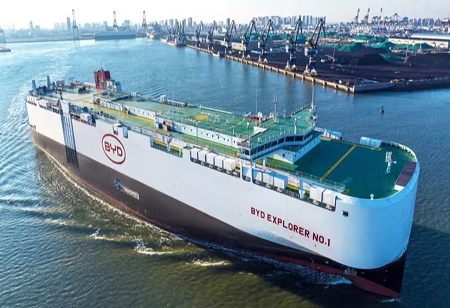
BYD to Deploy Eight Car Carriers to Boost Global EV Expansion

 BYD, the leading Chinese electric vehicle manufacturer, intends to expand its fleet of car carriers to eight within the next two years to enhance its export capabilities, reflecting the nation's growing influence in the realm of new energy vehicles, which is poised to extend to maritime transport. “BYD is going to deploy seven car carriers in the coming two years to ease the shortage of shipping capacity for automobile exports”, company Founder and Chairman Wang Chuanfu said.
BYD, the leading Chinese electric vehicle manufacturer, intends to expand its fleet of car carriers to eight within the next two years to enhance its export capabilities, reflecting the nation's growing influence in the realm of new energy vehicles, which is poised to extend to maritime transport. “BYD is going to deploy seven car carriers in the coming two years to ease the shortage of shipping capacity for automobile exports”, company Founder and Chairman Wang Chuanfu said.
In January, a vessel departed from Xiaomo International Logistics Port in Shenzhen, carrying BYD's electric vehicles (EVs) and other new energy vehicles (NEVs) bound for Europe. Named BYD Explorer No. 1, this roll-on, roll-off (RORO) ship was constructed by CIMC Raffles, a shipbuilding subsidiary of China International Marine Containers. With a capacity to accommodate 7,000 vehicles, the ship was commissioned by London-based shipping firm Zodiac Maritime. Remarkably, it represents the first car carrier crafted in a Chinese shipyard solely for exporting domestically manufactured vehicles.
CSSC Offshore & Marine Engineering, a subsidiary of China State Shipping Corporation, is also in the process of constructing two ships with the capacity to transport 7,000 BYD vehicles each. The construction of these vessels has already commenced in Guangzhou. As car carrier charter fees are on the rise, BYD aims to mitigate transportation costs by acquiring its own vessels.
China exported 4.9 million vehicles in 2023, up 58% from 2022, and surpassed Japan to become the world’s top exporter. Exports of NEVs, including plug-in hybrids, increased by 78% to 1.2 million units. BYD increased overseas NEV sales every month last year, reaching 240,000 units for the full year.
Despite the swift growth in exports, transportation capacity has failed to match the pace. As of November, Chinese ship owners possessed 40 car carriers, as reported by the UK-based company Clarksons Research. Demand for car carriers in China is now experiencing a rapid surge, largely propelled by NEV exports. By November, Chinese ship owners had commissioned 37 car carriers with a total capacity of 290,000 units, marking the highest current level globally.
Chinese shipbuilding firms, ship owners, and shipping companies, along with automakers, are collaborating to boost exports. China is particularly targeting Europe for NEV exports, given the region's environmentally conscious consumer base and the absence of significant electric vehicle successes from local manufacturers. BYD is broadening its sales network across Germany, Italy, France, Spain, and other countries. With vehicles like the compact Dolphin EV and the electric SUV Atto 3, the company aims to swiftly establish a brand presence before local rivals can close the gap.
The upward trajectory of exports is expected to persist, with the China Association of Automobile Manufacturers forecasting a 12% growth to 5.5 million units in 2024. Concurrently, Europe is cautious about the surge of Chinese EVs and has initiated an inquiry into Chinese government subsidies for electric vehicles. In a bid to address these apprehensions, BYD has disclosed intentions to establish a factory in Hungary within three years.

